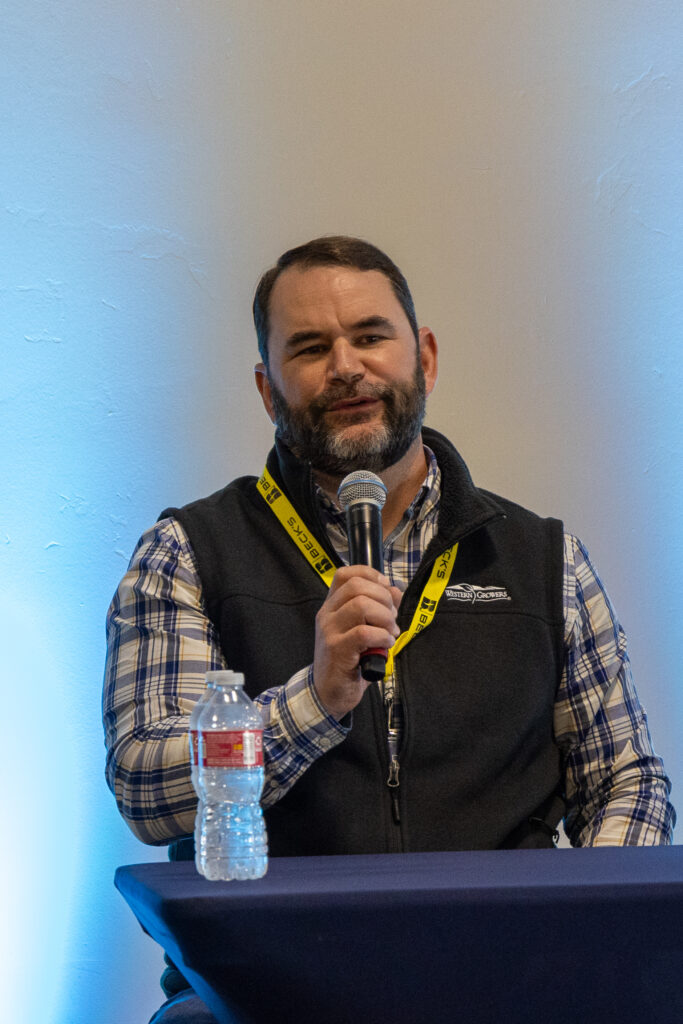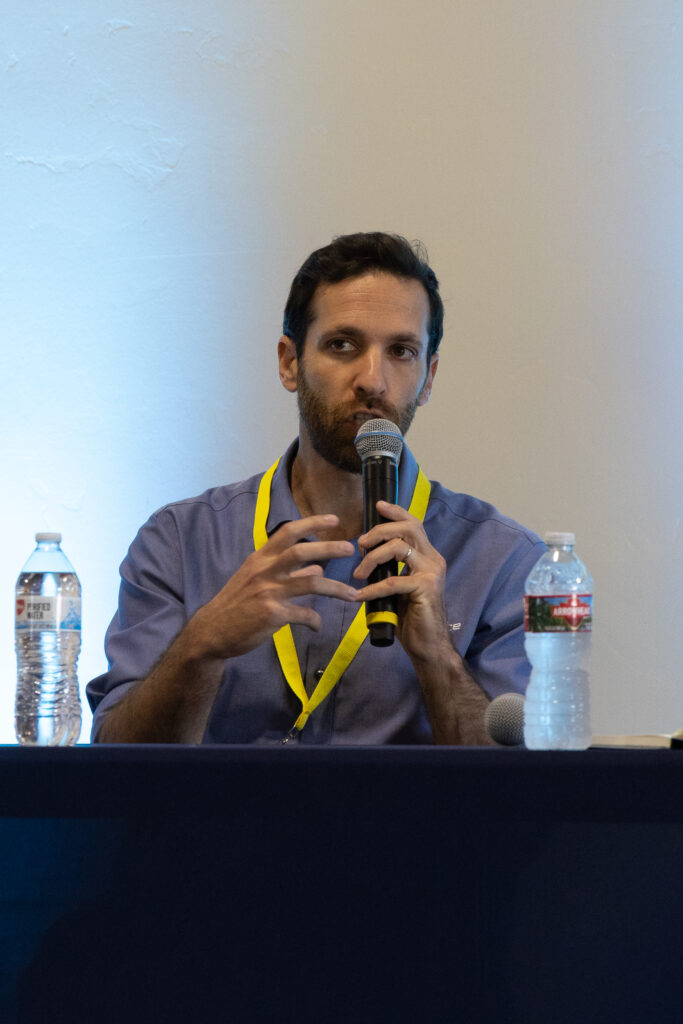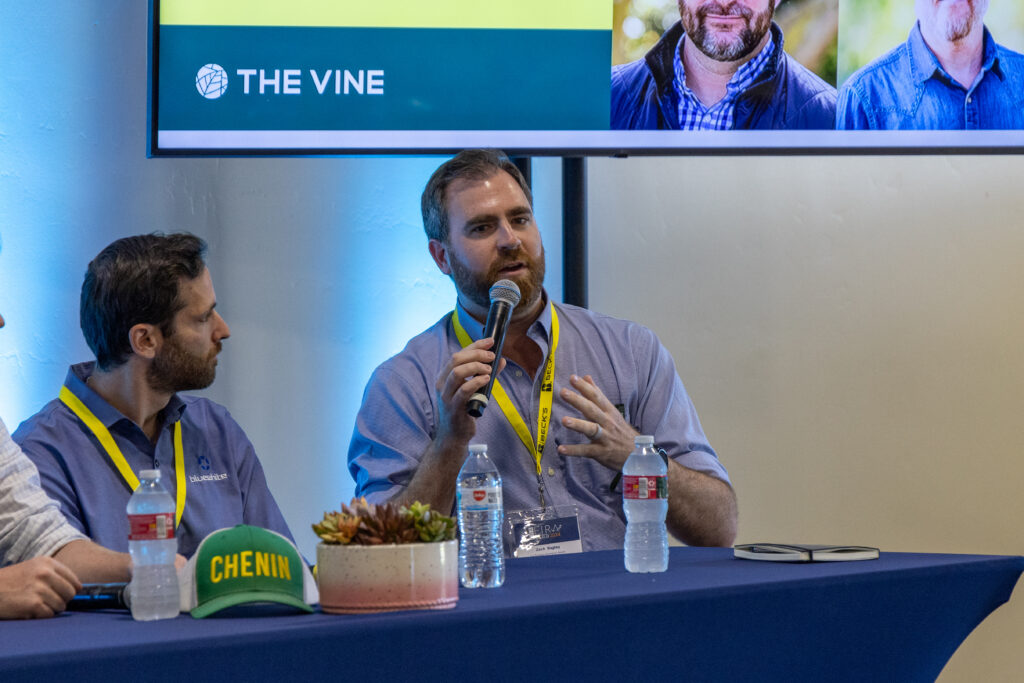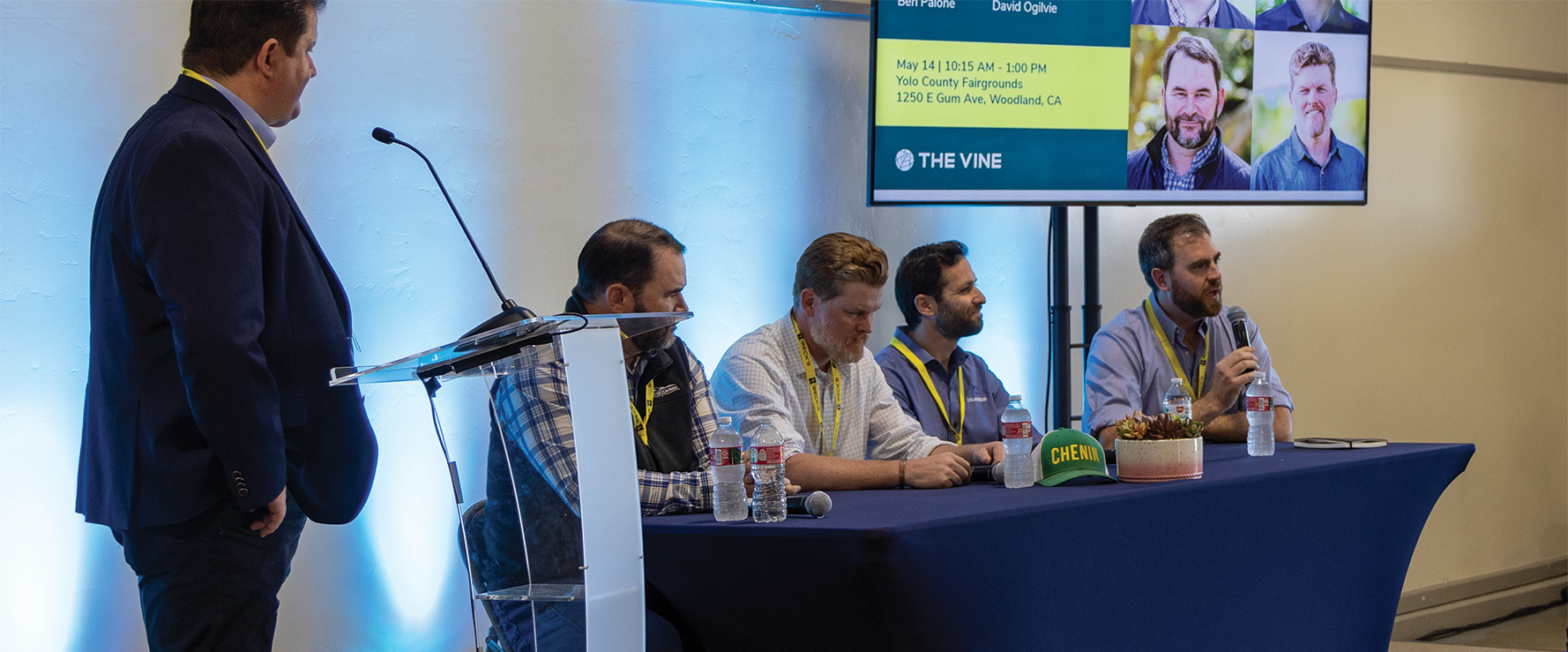Return on investment (ROI) in agricultural technology is crucial for efficient investments and sustainable growth. The latest VINE Connect event, held at the Yolo County Fairgrounds on May 14, 2024, delved into this topic extensively. This gathering brought together key stakeholders to discuss the latest advancements, challenges, and opportunities in maximizing ROI. The event emphasized the need for continuous innovation and collaboration to ensure that agricultural investments lead to long-term sustainability and profitability.
Opening Remarks FIRA USA 2024 Preview
The event began with a press conference hosted in partnership with GOFAR and Western Growers announcing FIRA USA 2024, our annual robotics and autonomous farming conference, which will be held in the fall in the Sacramento region. Gabe Youtsey, Chief Innovation Officer for University of California, Agriculture and Natural Resources and founder of the VINE, and Karen Ross, Secretary of the California Department of Food and Agriculture, delivered the opening remarks, highlighting key developments and expectations for the upcoming conference. Ross emphasized the importance of technological innovation in addressing the challenges faced by modern agriculture and reaffirmed the state’s commitment to supporting these advancements.
Following the opening remarks, there were demonstrations of the latest robotic and autonomous agricultural technologies from leading companies such as Bluewhite, Bonsai Robotics, Burro, Farm-ng, Ecro Robotix, and TRIC Robotics. These demonstrations provided insight into how robotics are enhancing efficiency, precision, worker safety, and sustainability in farming practices and offered a preview of what to expect at FIRA USA.
Panel Discussion: Why is Advanced Technology a Solution for California’s Agricultural Industry?
The main event featured a panel discussion titled “Why is Advanced Technology a Solution for California’s Agricultural Industry.” The panel, moderated by Gabe Youtsey included David Ogilvie, Owner of Wilson Vineyards; Zach Bagley, Managing Director of the California Tomato Research Board; Alon Ascher, Chief Business Officer of Bluewhite; and Ben Palone, Sr. Director of Automation & Commercialization at Western Growers.
The panel discussion revolved around three key themes: the role of technology in improving operational efficiency, the challenges and opportunities associated with data utilization, and the return on investment (ROI) for advanced agricultural technologies.
Improving Operational Efficiency
The adoption of advanced technologies has been a game-changer in enhancing operational efficiency in agriculture. David Ogilvie shared his firsthand experience with autonomous tractors, highlighting their impact on vineyard operations. He described how these tractors perform tasks overnight without requiring a driver, significantly boosting productivity and reducing labor costs. Ogilvie stated, “There’s nothing like waking up in the morning and seeing your field all done without a driver having to operate the tractor all night.” This level of automation has not only streamlined routine tasks but also provided the flexibility to explore additional applications, such as during harvest and for weed control.
Zach Bagley discussed the critical need for automation in tomato cultivation, particularly for labor-intensive tasks like transplanting and cultivation. He emphasized the potential for reducing labor costs and increasing efficiency, noting, “We need to move from a crew of 30 people to a crew of 3 people, allowing 27 people to do alternate tasks that increase production.” Bagley highlighted the back-and-forth process of field testing and adapting new technologies to meet the specific needs of tomato growers. This iterative approach ensures that the technologies are not only innovative but also practical and effective in real-world farming scenarios.
Alon Ascher added a broader perspective on how automation and robotics are changing farm operations. He detailed the advancements in autonomy and navigation, which have made robots more affordable and safer to use on farms. Ascher remarked, “The reduction in costs from the sensor level, computer level, and the availability of more open-source models has significantly improved performance.” He also emphasized the importance of smart implements and data integration in enhancing the precision and effectiveness of agricultural practices. This holistic approach enables farmers to optimize their operations, reduce input costs, and improve crop yields.




Challenges and Opportunities with Data Utilization
The panelists discussed the critical role of data in modern agriculture, focusing on both the significant opportunities it presents and the challenges that need to be addressed. Alon Ascher highlighted how the integration of data and automation is transforming farm management. He explained, “This is the first time farms are truly connected… we are generating a tremendous amount of new information that allows us to identify inefficiencies and improve operations.” Ascher emphasized that the continuous collection and analysis of data are essential for maximizing productivity and making informed decisions.
David Ogilvie shared his experience with data-driven technologies, illustrating both their potential and their limitations. He mentioned the challenges of effectively utilizing data collected from soil moisture probes, noting, “We gather all this data, but if I’m irrigating a whole block with multiple soil types all at once, the data becomes less useful.” Ogilvie highlighted the importance of having the right tools and infrastructure to act on the data collected, underscoring that simply gathering data is not enough; it must be actionable.
Ben Palone discussed the practical implications of data in agriculture. He noted that while data has the potential to revolutionize farming practices, many growers are still hesitant to fully embrace it. Palone explained, “Some growers are bullish on this and have hired their own data scientists… but it’s like turning a growing operation into a data harvesting facility rather than just harvesting crops.” He emphasized the need for data solutions that are practical and add real value without overwhelming growers.
Zach Bagley echoed these sentiments, stressing the importance of having manageable and actionable data. He pointed out that while data can provide valuable insights, it also requires significant resources to manage and utilize effectively. Bagley stated, “We’re not focusing on developing machines internally. Instead, we’re looking at technologies that are close enough and comparing them in the field with processing tomatoes to understand the data and references.” This approach allows growers to make informed decisions based on real-world performance data.
Return on Investment/ Return on Innovation
The discussion also focused on the financial and broader impacts of investing in advanced technologies. Quoting a term coined by VINE’s Industry lead Hannah Johnson, Gabe Youtsey introduced the concept of “return on innovation,” encompassing both financial returns and other benefits such as safety and environmental impacts. He pointed out that, “Automation for harvest has kept the [California tomato] industry alive and transformed it for the last 50+ years.”
David Ogilvie emphasized the importance of considering ROI beyond just the initial cost, mentioning the need for technologies to be versatile and useful throughout the year. He said, “I can’t afford to spend a lot of money on equipment that sits in the shed for 11 months out of the year.” Ogilvie stressed that the true value of technology lies in its ability to address multiple needs and improve overall operational efficiency, thus justifying the investment.
Ben Palone shared insights from case studies conducted by Western Growers, which provide unbiased financial analyses of new technologies. He explained that these studies help growers understand the real cost-benefit ratios. These case studies are crucial for growers who are hesitant to invest in expensive new technologies without clear evidence of their financial benefits. Palone added, “Startups must understand the importance of providing a clear value proposition… it’s crucial to have a solid ROI calculator.”
Alon Ascher brought a forward-looking perspective, discussing the necessity of innovation for the long-term survival of agricultural businesses. He stated, “These technologies are not luxury items meant to improve margins and profits. These technologies are becoming a necessity for survival and for maintaining a resilient business 3, 5, 7, even 30 years from now.” Ascher highlighted the importance of maximizing the use of existing assets and continuously improving operational efficiency to achieve a sustainable and profitable future.
Key Takeaways
The VINE Connect event underscored the essential role of technology and innovation in the future of agriculture. Here are the key takeaways from the event:
- Integration of Advanced Technologies: The use of robotics and automation can significantly improve operational efficiency. These technologies reduce labor costs, increase precision in farming practices, and enhance overall productivity.
- Careful Consideration of ROI: The return on investment (ROI) for advanced technologies must be carefully evaluated. While the initial cost can be high, the long-term benefits often justify the investment. Unbiased financial analyses can help growers understand the real cost-benefit ratios and make informed investment decisions.
- Return on Innovation: This concept encompasses both financial returns and other benefits such as safety and environmental impacts. Automation and advanced technologies are becoming critically important for the resilience of agricultural businesses. They enable farmers to maximize the use of existing assets, reduce input costs, and improve environmental sustainability.
- Balancing Technological Advancements with Financial Realities: The successful implementation of advanced technologies depends on a balanced approach that considers both technological advancements and the practical financial realities of farming. By thoughtfully integrating these technologies, the agricultural industry can overcome current challenges and achieve long-term growth and resilience.
Video
Watch a video of the press conference on our YouTube channel
Photo Gallery

We invite you to explore the photo gallery from the event to see highlights and moments captured throughout the day. https://flic.kr/s/aHBqjBqqvB
Join Us: FIRA USA 2024
Stay at the forefront of agricultural technology by attending FIRA USA 2024 on October 22-24 in Woodland, CA. Organized by The VINE, GOFAR, and Western Growers, this annual robotics and autonomous farming conference provides valuable insights and opportunities to explore the latest advancements. Admission is free for growers. Register now at FIRA USA 2024.**

